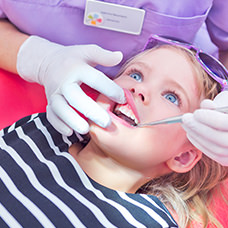Overview of Our Pediatric Dental Services in Munich
At Zahn im Glück, we offer a broad range of pediatric dental treatments.

Prophylaxis is not only about maintaining healthy teeth – it’s also about supporting overall health.
From a holistic perspective, the three key pillars of effective prophylaxis are nutrition, fluoride, and oral hygiene. In our practice, we guide and support our patients in all of these areas through:
- Nutritional counseling
- Professional dental cleanings
- Fissure sealants • Fluoride treatments
- Oral hygiene education (our toothbrushing school)

Fillings
Fillings come in different materials and qualities. Statutory health insurance covers the cost of glass ionomer cement and amalgam fillings. However, for health reasons, we do not offer amalgam fillings in our practice. Glass ionomer cement is a yellowish filling material that is softer than composite and may fall out unnoticed over time. In contrast, high-quality composite is a tooth-colored resin that is bonded to the tooth in three treatment steps. This material lasts significantly longer, is more resistant to pressure, and forms a tighter seal—reducing the risk of future cavities.
Whenever possible, we aim to preserve the natural tooth. In the case of pulp treatment (milk tooth endodontics), we treat the inflamed nerve of the baby tooth in order to ensure that:
- your child becomes pain-free again
- the tooth is preserved to maintain space for the permanent tooth
- the permanent tooth is not affected by the infection of the baby tooth

We use pediatric crowns when a baby molar is so severely damaged that it can no longer be restored with filling material.
Depending on the specific case, we use stainless steel crowns for back teeth and Frasaco crowns (full composite restorations) for front teeth. In a personal consultation, we’ll explain why a crown is needed for your child and which type is the best option.
Anesthesia
In our practice, no patient should ever feel pain. From local anesthesia to calming techniques like hypnosis, and even sedation or general anesthesia—we offer a range of options tailored to each patient's individual needs and the intensity of the treatment. After all, our personal goal with every treatment is to see your child smile again. Read more in our blog post: “Dental anxiety in children – what can you do?”
Your pediatric dentist in Munich has the answers.
We’re happy to help with any questions you may have about your child’s dental health.
What is pediatric dentistry?
Children’s teeth are not the same as adult teeth. That’s why pediatric dentistry differs from general dentistry in many important ways. Pediatric dentistry began to develop as its own field in the late 18th century. Good, strong teeth for life are often built on the habits and care that start in early childhood. This is also the time when children form their long-term attitude—positive or negative—toward dental visits. Pediatric dentistry requires special treatment concepts that are tailored to the anatomical, physiological, and psychological needs of children.
At Zahn im Glück, we treat our young patients with this philosophy in mind—and always with the right amount of joy that a visit to your pediatric dentist in Munich should bring.
What types of treatments are available in pediatric dentistry?
It’s important to understand that a child’s mouth is still developing. The skull is still growing, and children have primary (baby) teeth, with permanent teeth typically beginning to emerge around age six. This requires specialized diagnostic and treatment approaches, carried out by a team trained specifically in pediatric care. Pediatric dentistry includes the following areas of treatment:
Preventive Measures
- Prophylaxis to maintain dental health and proper tooth alignment
- Nutritional counseling
- Fluoride treatments
- Fissure sealants
Treatment of Dental Issues
- Management of tooth decay, gum disease, and infections of the dental nerve
Early Orthodontic Treatment
- Monitoring and guidance of jaw and tooth development in early childhood
Treatment of Dental Injuries
- Care following accidents, falls, or dental trauma
What are the goals of pediatric dentistry?
Prevention, education, and raising awareness about oral care and hygiene are at the heart of our work. At your pediatric dental practice in Munich, we work closely with parents to support and maintain their child’s dental health right from the start.
We offer detailed guidance and explain everything in a child-friendly way. Using fun and engaging models, we show our young patients how to brush and care for their teeth like real pros.
Thanks to the close collaboration between our dentists and orthodontists at Zahn im Glück, we can detect and treat dental and jaw misalignments at an early stage. Monitoring the change from baby to permanent teeth, as well as recognizing and addressing oral habits or dysfunctions early on, are also important aspects of preventive care.
Pediatric Dentistry: What Happens During the Tooth Transition Phase
Around the age of five or six, it begins: the first baby teeth start to loosen and fall out, making room for the permanent teeth. This transition is usually painless, as the roots of the baby teeth dissolve before they fall out, allowing the permanent teeth to gently push them out of the jaw. Because permanent teeth are already developing beneath the baby teeth, it’s especially important to keep baby teeth healthy and well cared for. If baby teeth are affected by cavities or infections, these problems can transfer to the underlying permanent teeth—potentially causing long-term damage.
One of the most important differences between baby teeth and permanent teeth is the tooth enamel. The enamel on permanent teeth is about twice as thick as that of baby teeth, making them more durable. However, it’s important to know that newly erupted permanent teeth are particularly vulnerable to cavities, as their enamel takes about three years to fully harden. If you have any further questions, the pediatric dental team here in Munich is always happy to help.
Warm regards,
Dr. Sabrina Neumann